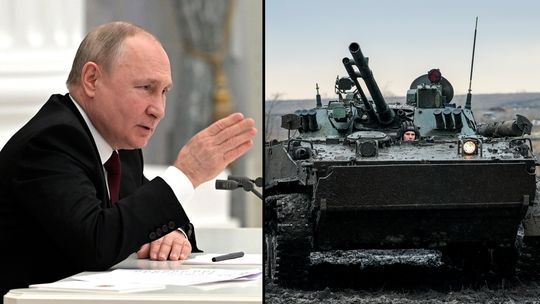Markets
S&P 500 Falls Into Correction Territory as Russian Troops Enter Ukraine Region
First American News LLC-Raleigh, NC: All three major stock indexes fell at least 1% after the White House called Russia’s deployment of troops into two breakaway areas of Ukraine “the beginning of an invasion.” Tensions escalated Monday after Russia moved soldiers into Ukraine’s eastern Donbas region, where Russian President Vladimir Putin has recognized two statelets there as independent.
Everything from shares of high-growth technology companies to banks, manufacturers and other stocks closely tied to the economy fell in afternoon trading, undoing major benchmarks’ brief run in the green earlier in the session. The losses pulled the S&P 500 down 1%, knocking the broad benchmark off more than 10% from its Jan. 3 high, meeting the criteria of a market correction if it closes at or below current levels.
The Dow Jones Industrial Average tumbled 1.4% and the Nasdaq Composite slid 1.2%.
Now, investors are assessing the threat of an all-out war in Ukraine and the ramifications of sanctions threatened by Western countries. President Biden unveiled a host of sanctions against Russia that targeted two of its banks, its sovereign debt and wealthy individuals. The afternoon announcement helped push major benchmarks up from their session lows.
Earlier, the European Union proposed a ban on purchases of Russian bonds, among other actions, while Germany said it halted moves to open a natural-gas pipeline to Europe that would bypass Ukraine, helping to send energy prices sharply higher.
“Investors are de-risking as the situation escalates and uncertainty builds regarding the path forward,” said Lindsey Bell, chief markets and money strategist for Ally Invest. “Markets are likely to be on edge for the next several weeks.”
Investors fear a war between Russia and Ukraine could disrupt commodities supplies, when inflationary pressures already are weighing on growth and prompting central banks to tighten monetary policy. A conflict threatens to crimp access to Russian gas and disrupt the region’s sizable trade in agricultural commodities. Brent crude, the global oil benchmark, rose 1.5% to $96.84 a barrel.
Ms. Bell added geopolitical tensions tend to have a dramatic, immediate effect on markets, but the shock usually wears off over time. Besides higher oil prices, Russia’s potential invasion of Ukraine isn’t likely to have a significant impact on the U.S. economy, she said.
Still, investors broadly sold stocks.
Consumer discretionary stocks were hit hardest, with the sector shedding 3.4% in the S&P 500. Geopolitical tensions played a part, analysts said, as did concerns about economic growth this year.
Home Depot led the group lower, falling nearly 9%, after the company posted slightly slower sales growth than it did earlier in the pandemic, making it the biggest drag on the price-weighted Dow.
Other retail stocks followed, with Best Buy, Lowe’s and Dollar General all falling more than 3%. Makers of household durables, including Whirlpool and D.R. Horton, also fell alongside shares of hotels, restaurants and leisure companies.
Technology stocks in the S&P 500, which were briefly higher earlier in the day, fell 1.3%. Communication companies shed 1.1%.
The showdown along Ukraine’s border also spoiled some relatively upbeat earnings news. Shares of Macy’s slid 5% even after the retailer posted better-than-expected earnings.
In corporate news, SoFi Technologies shed more than 10% after The Wall Street Journal reported that it was buying banking-software maker Technisys for about $1.1 billion.
In the bond market, the yield on the benchmark U.S. Treasury note edged higher. Gold prices rose 0.2%.
Elsewhere, Russia’s benchmark MOEX stock index climbed 1.6%, turning higher after the sanctions unveiled in the EU and U.K. didn’t target Russia’s biggest banks. The index dropped 10.5% Monday, which was its biggest daily percentage decline in almost eight years. The ruble edged higher against the dollar after falling to its lowest level since February 2020.
European stock indexes reversed earlier sharp losses, with the pan-continental Stoxx Europe 600 up 0.1%. Asia’s benchmark indexes closed lower, with Hong Kong’s Hang Seng indexes down 2.7% and Japan’s Nikkei falling 1.7% lower.
“Investors have switched from thinking it is posturing, saber-rattling to thinking there has become a real threat of a conflict,” said Altaf Kassam, head of investment strategy and research for Europe, the Middle East and Africa at State Street Global Advisors. “Things have gotten to a point where it feels like it is hard to step back from.”
Top Digital News Subscriptions


